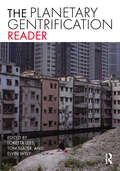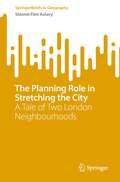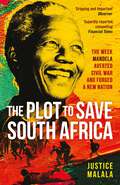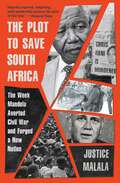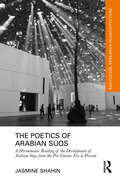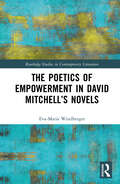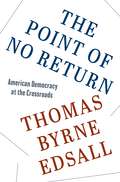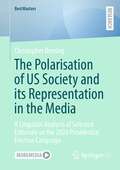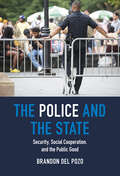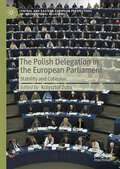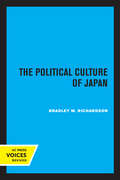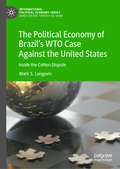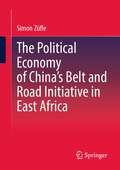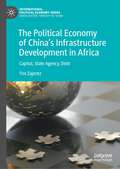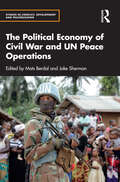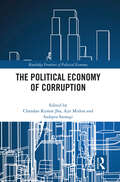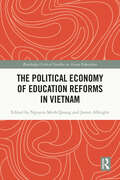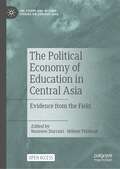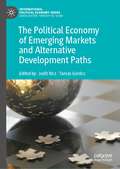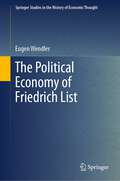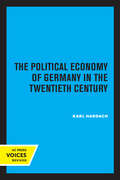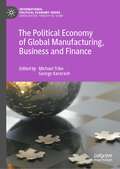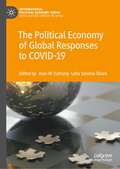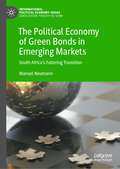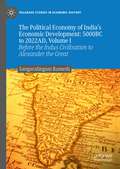- Table View
- List View
The Planetary Gentrification Reader
by Loretta Lees Tom Slater Elvin WylyGentrification is a global process that the United Nations now sees as a human rights issue. This new Planetary Gentrification Reader follows on from the editors’ 2010 volume, The Gentrification Reader, and provides a more longitudinal (backward and forward in time) and broader (turning away from Anglo-/Euro-American hegemony) sense of developments in gentrification studies over time and space, drawing on key readings that reflect the development of cutting-edge debates. Revisiting new debates over the histories of gentrification, thinking through comparative urbanism on gentrification, considering new waves and types of gentrification, and giving much more focus to resistance to gentrification, this is a stellar collection of writings on this critical issue. Like in their 2010 Reader, the editors, who are internationally renowned experts in the field, include insightful commentary and suggested further reading. The book is essential reading for students and researchers in urban studies, urban planning, human geography, sociology, and housing studies and for those seeking to fight this socially unjust process.
The Planning Role in Stretching the City: A Tale of Two London Neighbourhoods (SpringerBriefs in Geography)
by Shlomit Flint AsheryThis research aims to uncover new insights into minority housing strategies and their impact on densely populated urban areas. The study assumes that as space becomes scarce, inter and intra groups interactions in the urban space motivate people to maximize the utility of the resources at their disposal. This ‘stretch’ of the built environment provides them with critical selective advantages and a sense of security and belonging. Based on two neighbourhoods in London, it contributes to our understanding of housing decisions in the context of illegality and shows the capacity of a given urban form for adaptation: It creates a new semi-private/public space, partly segregated yet deeply integrated; a sphere that, on the one hand, enables traditional ‘nested’ places and, on the other, a fertile environment for integration. This manuscript contributes two new ideas to the knowledge base of residential selections and the geography of opportunities. The first is a detailed analysis of a hyper-segregation/integration pattern resulting from complementary residential strategies operating at the individual unit level. The second is multidimensional stretching, a bottom-up initiation that allows individuals to maximize resources through territorial and spatial practices.
The Plot to Save South Africa: The Week Mandela Averted Civil War and Forged a New Nation
by Justice MalalaNine days that set the course of a nation...Johannesburg, Easter weekend, 1993. Nelson Mandela has been free for three years and is in slow-moving power-sharing talks with President FW de Klerk when a white supremacist shoots Mandela&’s popular young heir apparent, Chris Hani, in the hope of igniting an all-out civil war. Will he succeed in plunging South Africa into chaos, safeguarding apartheid for perhaps years to come? Or can Mandela and de Klerk overcome their differences and mutual suspicion and calm their followers, plotting a way forward?In The Plot to Save South Africa, acclaimed South African journalist Justice Malala recounts the riveting story of the next nine days – never before told in full – revealing rarely seen sides of both Mandela and de Klerk, the fascinating behind-the-scenes debates within each of their parties over whether to pursue peace or war, and their increasingly desperate attempts to restrain their supporters despite mounting popular frustrations.Flitting between the points of view of over a dozen characters on all sides of the conflict, Justice Malala offers an illuminating look at successful leadership in action… and a terrifying reminder of just how close a country we think of today as a model for racial reconciliation came to civil war.
The Plot to Save South Africa: The Week Mandela Averted Civil War and Forged a New Nation
by Justice MalalaA &“gripping and important&” (The Guardian) account of nine tumultuous days, as the assassination of Nelson Mandela&’s protégé by a white supremacist threatens to derail South Africa&’s democratic transition and plunge the nation into civil war.Johannesburg, Easter weekend, 1993. Nelson Mandela had been released after twenty-seven years in prison and was in power sharing talks with President F.W. de Klerk. After decades of resistance, the apartheid regime seemed poised to fall…until a white supremacist shot and killed Mandela&’s popular heir apparent, Chris Hani, in a last desperate attempt to provoke civil war. Twenty-two-year-old rookie journalist Justice Malala was one of the first people at the crime scene. And as he covered the growing chaos of the next nine days—the protests and police brutality, reprisal killings and calls for paramilitary units to get combat-ready—he was terrified the assassin&’s plot might succeed. In The Plot to Save South Africa, Malala &“masterfully&” (Foreign Affairs) unspools this political history in the style of a thriller, alternating between the perspectives of participants across the political spectrum in a riveting, kaleidoscopic account of a country on the brink. Through vivid archival research and shocking original interviews, he digs into questions that were never fully answered in all the tumult at the time: How involved were far-right elements within the South African government in inciting—or even planning—the assassination? And as the time bomb ticked on, how did these political rivals work together with opponents whose ideology they&’d long abhorred—despite provocation and their own failures, doubts, and fears—to keep their country from descending into civil war?
The Poetics of Arabian Sūqs: A Hermeneutic Reading of the Development of Arabian Sūqs from the Pre-Islamic Era to Present (Routledge Research in Architecture)
by Jasmine ShahinThis book investigates the history of Arabian sūqs from their pre-Islamic beginnings to the present. Collecting evidence from archaeological ruins, Islamic towns, modern cities, Arabic poetry, philosophical debates, political conflicts, puppet shows and the insights of modern-day market-goers, the book presents new and unforeseen interpretations of the Arabian sūq’s meaning and its transformation through time and place. The finding that such meaning is tied to ancient trade rituals, where temple and market presented a holistic socio-urban unit, re-questions some instrumental assumptions regarding the value of sūq-ness in Arabia’s everyday practices. Such a finding, which locates the fadaā/tareeq duality as a central theme in Arabia’s socio-urban discourse, emphasizes the importance of lived experiences and poetics as key sources for understanding socio-urban phenomena.
The Poetics of Empowerment in David Mitchell’s Novels (Routledge Studies in Contemporary Literature)
by Eva-Maria WindbergerThe Poetics of Empowerment in David Mitchell’s Novels combines the investigation of David Mitchell’s novels with the introduction of a new critical concept to literary studies: empowerment. Aiming to situate and establish empowerment firmly within the context of literary studies, it offers the first framework and definition for reading fictional texts with the lens of empowerment and applies it in the analysis of discourse, the fictional characters, and the role of the reader in Mitchell’s novels. Drawing on narratological analysis, cognitive approaches to literature, and reader-response theory, it features close readings of Cloud Atlas (2004), Black Swan Green (2006), and The Thousand Autumns of Jacob de Zoet (2010) and dissects the author’s strategies, poetics, and agenda of empowering fiction. This book argues for an inherent, indissoluble connection between empowerment and the telling of stories and demonstrates how literary studies can benefit from a serious engagement with empowerment—and how such an engagement can stimulate new responses to fiction and put literary studies in conversation with other disciplines.
The Point of No Return: American Democracy at the Crossroads
by Thomas Byrne EdsallHow Donald Trump laid waste to American politics, culture, and social orderAfter Donald Trump’s rise to power, after the 2020 presidential election, after January 6, is American politics past the point of no return? New York Times columnist and political reporter Thomas Byrne Edsall fears that the country may be headed over a cliff, arguing that the election of Donald Trump was the most serious threat to the American political system since the Civil War. In this compelling and illuminating book, Edsall documents how the Trump years ravaged the nation’s politics, culture, and social order. He explains the demographic shifts that helped make Trump’s election possible, and describes the racial and ethnic conflict, culture wars, rural/urban divide, diverging economies of red and blue states, and the transformation of both the Republican and Democratic parties that have left our politics in a state of permanent hostility.The Point of No Return brings together a series of Edsall’s columns, bookended by a new introduction and conclusion, which show how we got to this dangerous point. These dispatches from our new political landscape chronicle the emergence of what Edsall calls “the not-so-silent white majority” and show how Trump deployed fears about race and immigration to appeal to voters. Edsall examines Trump’s construction of an alternate reality, discusses why we don’t always vote according to our own self-interest, and explores the Democrats’ calibrated response. Considering the 2020 election and its violent aftermath, Edsall looks at the Capitol insurrection and warns that American democracy is under siege. The forces behind Trump’s election, and the “stop the steal” true believers, have pushed the nation to the brink.
The Polarisation of US Society and its Representation in the Media: A Linguistic Analysis of Selected Editorials on the 2020 Presidential Election Campaign (BestMasters)
by Christopher BerningThis book is concerned with the polarisation of US society as represented in 27 editorial articles on the presidential election campaign 2020, taken from three different newspapers. The aim of the study is to develop an integrated framework for the linguistic analysis of societal polarisation, which combines findings from the political sciences and sociology with critical linguistic concepts from political discourse analysis and newspaper discourse analysis. The main finding is that all three newspapers, irrespective of their political orientation, make use of polarising discourse around the presidential election 2020 and thus partially contribute to a split US society. The explicit presentation of the media company’s stance as well as the distinct rejection and the explicit portrayal of aversion towards opposing positions can be detected as main factors in creating a polarising environment. Equally interesting appeared the prevalence of the topos Threat/ Crisis/ Defeat in all three newspapers, indicating a focus on negativity. De-polarising elements are only rarely found and do not seem to be contributing to the easing of tensions in society.
The Police and the State: Security, Social Cooperation, and the Public Good
by Brandon del PozoAs we wrestle with the role and limits of policing, a political philosopher who spent over two decades as a New York City police officer and Vermont chief of police presents a normative account of what it means to police a pluralist democracy. Invoking his vast experience, Brandon del Pozo argues that we all have the prerogative to use force to protect others, but police embody the government's unique duty to do so effectively and with restraint. He recasts order maintenance as brokering and enforcing the fair terms of social cooperation in our public spaces, for the protection of minority interests, and for a society where diverse conceptions of the good can flourish. The reasons why we police, he says, must be ones that all citizens can evaluate as equals. His book explains the democratic commitments of policing, and lays the groundwork for meaningful police innovation and reform.
The Polish Delegation in the European Parliament: Stability and Cohesion (Central and Eastern European Perspectives on International Relations)
by Krzysztof ZubaBased on the example of the Polish delegation to the European Parliament, the book examines the factors influencing the cohesion and stability of EP national delegations. It takes into account the impact of institutional arrangements such as the electoral law and the candidate selection process, the ideological and programmatic profiles of political parties, the career paths of MEPs, affiliation to political groups in the EP, group switching, as well as the significance of Euroscepticism and national divisions transferred to the European level. It is not a typical case study, as the regularities discovered through the in-depth analysis of the Polish national delegation are compared with those characteristic of other national delegations in the EP. The book fills a gap in studies devoted to the EP, in which the importance of national delegations has not so far been the subject of thorough analyses.
The Political Culture of Japan (Center for Japanese Studies, UC Berkeley #11)
by Bradley M. RichardsonThis title is part of UC Press's Voices Revived program, which commemorates University of California Press’s mission to seek out and cultivate the brightest minds and give them voice, reach, and impact. Drawing on a backlist dating to 1893, Voices Revived makes high-quality, peer-reviewed scholarship accessible once again using print-on-demand technology. This title was originally published in 1974.
The Political Economy of Brazil’s WTO Case Against the United States: Inside the Cotton Dispute (International Political Economy Series)
by Mark S. LangevinThis book is about the remarkable trade conflict between two agricultural superpowers with a focus on Brazil’s rapid agricultural modernization in recent decades and its impact on trade policy formation and global economic governance. Previous research, including Black (2016), trace the origins and evolution of the cotton dispute up to the August 31, 2009 final arbitration ruling that authorized Brazil to impose retaliatory trade measures to compel U.S. compliance. Inside the Cotton Dispute offers a comprehensive examination of the bilateral relations and negotiations that culminated with the October 2014 mutual solution to one of the most important trade conflicts since the establishment of the World Trade Organization.
The Political Economy of China’s Belt and Road Initiative in East Africa
by Simon ZüfleThis book examines the implementation of the Belt and Road Initiative (BRI) in East Africa. The BRI is considered China's central geopolitical and geo-economic project in the era of President Xi Jinping. Through this work, the author aims to contribute to filling some research gaps, such as the lack of depth in studies of individual BRI projects and the underconsideration of processing narratives in participating countries. The guiding question is the extent to which the BRI is a political or hegemonic project of the CCP-directed state-civil society complex in East Africa. To answer these questions, databases of international organizations and policy documents are analyzed. In addition, the author conducts a qualitative content analysis of newspaper articles from local media houses in the countries of Ethiopia, Kenya, and Tanzania to examine three infrastructure projects. The work illustrates that the BRI contributes to increasing connectivity in East Africa. At the same time, the compression of economic relations and the implementation of infrastructure projects in East Africa lead to numerous consequences and contour a hegemonic project.
The Political Economy of China’s Infrastructure Development in Africa: Capital, State Agency, Debt (International Political Economy Series)
by Tim ZajontzThis book sheds light on structural drivers that led to the Chinese omnipresence in African infrastructure markets and offers a strategic-relational approach to the study of African agency in Sino-African infrastructure encounters. Case studies cover the Tanzania-Zambia Railway Authority (TAZARA), Zambia’s road sector as well as Tanzania’s Bagamoyo port and Standard Gauge Railway. It is shown that African (state) agency in the infrastructure sector is contingent upon dynamic state-society relations and distinct political-economic contexts and constraints. The book problematises contradictions related to infrastructure debt, the emergence of Sino-African public-private partnerships and the intensifying geopolitics-cum-geoeconomics of infrastructure across Africa.
The Political Economy of Civil War and UN Peace Operations (Studies in Conflict, Development and Peacebuilding)
by Mats Berdal Jake ShermanThis book examines the operational and political challenges facing UN peace operations deployed in countries where civil war and protracted violence have given rise to the complex and distinctive political economies of conflict. The volume explores the nature and impact of such political economies – informal systems of power and influence formed by the interaction of local, national, and region-wide war economies with the political agendas of conflict actors – on the course of UN peace operations. It focuses in detail on the UN’s long-running peace operations in the Democratic Republic of Congo, South Sudan, Afghanistan, Sierra Leone, Mali, and Somalia. The book is centrally concerned with the interaction of UN missions with the power structures and local conflict dynamics that shape individual mission settings, and the challenges these pose for mediation, protection of civilians, and other tasks. It also offers a critical assessment of the various ways in which the UN ‘system’, from its headquarters in New York to the field, has confronted the policy challenges posed by political economies of conflict-affected states, societies, and regions. It advances a pragmatic set of policy recommendations aimed at improving the UN’s ability to confront predatory and exploitative war economies. At the same time, the volume makes it clear that political and institutional obstacles to more effective UN action are certain to remain profound and are unlikely ever to be fully overcome let alone eradicated. Despite making some progress since the 1990s to better understand the political economy of civil wars, the UN has struggled with how to tackle informal networks of power and their consequences for efforts to end wars. The book will be of special interest to students of war and conflict studies, statebuilding, political economy of conflict, UN interventionism and peacebuilding, and IR/Security in general.
The Political Economy of Corruption (Routledge Frontiers of Political Economy)
by Sudipta Sarangi Ajit Mishra Chandan Kumar JhaCorruption, commonly defined as the misuse of public office for private gains, is multifaceted, multidimensional and ubiquitous. This edited collection, featuring contributions from leading scholars in the field of corruption, goes beyond the standard enforcement framework wherein individuals only compare the expected costs and benefits of a corrupt act. These chapters explore the political-cultural contexts, legal and regulatory process and, above all, moral and psychological factors in attempts to understand and explain corruption. The book explores a broad canvas where gender, technology, culture and institutional structures influence attitudes towards corruption. Design and implementation of anti-corruption strategies benefit from suitable identification of these factors contributing to the prevalence and persistence of corruption. Combining theoretical and empirical studies with evidence from experiments as well as case studies, the book provides crucial state of the art in corruption research in a highly accessible manner. This book serves as a vital reference to students and scholars in economics, politics and development studies. Additionally, policymakers and development practitioners can use the insights from this book in successful design and implementation of anti-corruption policies.
The Political Economy of Education Reforms in Vietnam (Routledge Critical Studies in Asian Education)
by Nguyen Minh QuangThis book, drawing on a political economic perspective of education development, is a comprehensive account of the question "why some education systems flourish while others falter." It provides a state-of-the-art review of the Vietnamese way of education development, figuring out the pitfalls, challenges and opportunities of neoliberal reform. It also sheds new light on the rise of neoliberal capitalism in contemporary Vietnam as the country intensifies its market-oriented economic transition. Starting from educational development concerns, this book differentiates the growth and development concepts in education. While "growth with limited development" is well reflected in many developing education systems, the Vietnamese experience of education development stands to provide readers with unique insights about education in developing economies, especially in understanding how a socialist-oriented education system is struggling to thrive in the times of neoliberal capitalism. Authored by scholars specialising in Vietnamese education and politics, the chapters address key issues pertaining to the political economy of education reform in Vietnam and the government’s enduring efforts to drive education toward international standards through its costly market-infused education reforms. This book will appeal to postgraduate students, educators, educational policy-makers and scholars interested in Vietnamese studies, Vietnam education reforms, education governance, education for sustainability, internationalisation of education and the politics of education reforms.
The Political Economy of Education in Central Asia: Evidence from the Field (The Steppe and Beyond: Studies on Central Asia)
by Naureen Durrani Hélène ThibaultThis open access book is intended as an original contribution to the conversation on the role and challenges of education in Central Asia to promote social cohesion by looking at Kazakhstan, Tajikistan and Uzbekistan. Examining education challenges within the countries’ wider historical, social, political, and cultural context, the contributions explore existing discourses concerning national identity, religion, language, gender, inclusion, internationalisation of education, and non-state actors through a Political Economy Analysis (PEA) lens. With the understanding that education is both a powerful mechanism of social reproduction in societies and a driver of social change, the book attempts to promote political economy analysis of education as a helpful analytical tool for educational debates and reform agendas in the region and thus will be a valuable resource for policymakers, practitioners, and scholars in this region and beyond.
The Political Economy of Emerging Markets and Alternative Development Paths (International Political Economy Series)
by Tamás Gerőcs Judit RiczThis volume is the continuation of our research on economic and developmental policy-making in the global semi-periphery in the post-crisis cycle (see our two recently published volumes titled ‘Market-Liberalism and Economic Patriotism in Capitalist Systems’ edited by Gerőcs and Szanyi, 2019, Palgrave Macmillan and ‘The Post-Crisis Developmental State – Perspectives from the Global Periphery’ edited by Gerőcs and Ricz, 2021). Our new volume aims to be a contribution to the analysis of emerging market economies’ alternative development trajectories, as we explore the new perspectives on semi-peripheral dependent development since the Global Financial Crisis and especially amidst the new global pandemic, the COVID-19. The scope of comparative capitalism research has also been altered accordingly to include the analysis of emerging economies outside the core of the world system, and to make intertemporal comparisons possible (such as to define and characterise historical waves of state capitalism). Still, we are convinced that to better understand the current wave of state capitalism and to explore its national varieties there is a need to critically reconsider existing theoretical approaches and methodologies, and to search for new ones, if necessary. This book aims to be a contribution to the analysis of emerging market economies' alternative development trajectories and explores new perspectives on semi-peripheral dependent development, especially amidst COVID-19.
The Political Economy of Friedrich List (Springer Studies in the History of Economic Thought)
by Eugen WendlerThis book offers a comprehensive assessment of Friedrich List's economic and political thinking. It starts with a systematic positioning of List`s economic theory as well as a differentiation from other economic systems. Furthermore, it examines the ethical sources of List`s theory, as well as List`s geopolitical, technical and economic visions. The author also introduces List as the pre-thinker of social market economy and discusses his ideas on European integration, development politics and List’s assessment of the main problems of the modern world economy. The book will appeal to scholars and students of the history of economic thought and economic history, as well as anyone interested in the life and work of the German economist Friedrich List (1789-1846).
The Political Economy of Germany in the Twentieth Century
by Karl HardachThis title is part of UC Press's Voices Revived program, which commemorates University of California Press’s mission to seek out and cultivate the brightest minds and give them voice, reach, and impact. Drawing on a backlist dating to 1893, Voices Revived makes high-quality, peer-reviewed scholarship accessible once again using print-on-demand technology. This title was originally published in 1980.
The Political Economy of Global Manufacturing, Business and Finance (International Political Economy Series)
by George Kararach Michael TribeThis book is written as a tribute to Frederick Nixson’s extensive work on industrial development in the Global South, while seeking to actively engage with the latest arguments concerning development economics, together with changes in manufacturing and industrial policy that continue to shape the role of the Global South in the international economy, the impact of the increased concentration of global multinational corporations in that space, along with the rise of new financing tools and debt traps. The chapters pay homage to Fred’s broad view of the international development process and reflect his breadth of perception both theoretically and geographically. The book targets both the scholarly and policymaking audience.
The Political Economy of Global Responses to COVID-19 (International Political Economy Series)
by Leila Simona Talani Alan W. CafrunyThis book seeks to identify the reasons why some countries were more efficient and effective than others in responding to the COVID 19 pandemic, and why the global community failed to coalesce. What are the political determinants of the different state responses to the pandemic? Why was scientific advice rejected or ignored in many countries? What has been the role, respectively, of neoliberalism, populism, and authoritarianism in the making of Covid-19 policy? What role have each of these factors played in the uneven and clearly inadequate global response to the pandemic?In an effort to understand why some states failed to handle the pandemic properly, some of the literature suggests that populism is at the root of the current failure of international co-operation. The global financial crisis of 2008-10 triggered significant cooperation within the G-20, led by the combined efforts of the United States and China. These forms of cooperation have clearly disappeared in the context of the pandemic, not only with respect to economic policy but also in public health and management. The authors of this volume link the different state responses to the pandemic-- from its inception to the start of the vaccination campaign, and to the political regimes prevailing in each. In particular, the present volume focuses on a distinction between the responses of neo-liberal regimes, populist regimes and authoritarian ones.
The Political Economy of Green Bonds in Emerging Markets: South Africa's Faltering Transition (International Political Economy Series)
by Manuel NeumannFunding low-carbon transitions to address climate change is one of the major challenges of our time. Green bonds have emerged as a powerful tool to enlist institutional investors’ wealth for these transitions. But despite exponential growth in many parts of the world, the green bond market in South Africa has been stalling. This book project grapples with this puzzle. Firstly, it debunks some of the promises underpinning green bond markets and traces the manifold practices undergirding its promotion. Secondly, it identifies some barriers prohibiting the expansion of green bonds in emerging markets and zooms in on the depoliticizing tendencies a transition premised on financial innovation produces. Thirdly, this work discloses the idiosyncratic political economic challenges of a fossil-based economy in transition and shines a light on the competing elements of a ‘green’ and a ‘just’ transition. It argues that the limited uptake of green bonds can best be explained by the instrument’s inability to adequately incorporate the various demands levied on South Africa’s contested transition trajectory. In so doing, this book contributes important new qualitative insights into green bond markets-in-the-making and extends political economic scholarship on finance-led transition endeavors in emerging markets.Chapters 3 and 6 is available open access under a Creative Commons Attribution 4.0 International License via link.springer.com.
The Political Economy of India's Economic Development: Before the Indus Civilisation to Alexander the Great (Palgrave Studies in Economic History)
by Sangaralingam RameshThis book, the first of two volumes, explores India’s economic development from 5000BC through to the India’s independence period from 1947AD to 2022AD. The specific characteristics of economic development in India are examined to help determine development paths India can pursue to create sustainable development in the 21st century. The transition from the primary section to the secondary sector, through the process of industrialisation and in turn the move towards the services sector, is discussed in relation to climate change and the pressure on resources posed by population growth.This book aims to contextualise India’s economic development within the political economy of trade, sustainable development and culture with a particular focus on the institutions that have emerged in the Indian sub-continent since 5000BC. It will be relevant to students and researchers interested in economic history, development economics, and the political economy.
